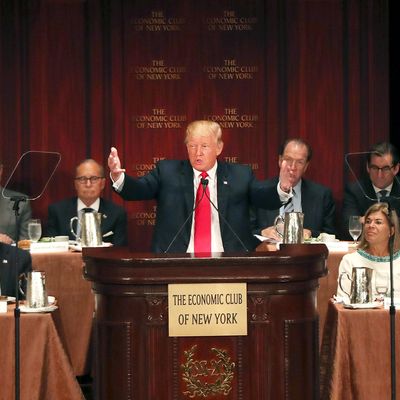
Donald Trump has said that every position he takes is merely the opening bid in a negotiation (toward the hallowed deal, his imagined talent for which forms the basis of his self-made myth). Nowhere is that more true than on domestic economic policy, where Trumpism is a whirligig of endless motion. Trump knows so little about domestic policy, and is so susceptible to influence by whoever spoke with him last, that there is hardly any point in describing his “position,” since it changes so frequently. Even identifying Trump’s stance at any given point in time is often impossible, since details are often sparse and contradictory, and the candidate describes them in his trademark dialect of hyperbolic sentence fragments.
The centerpiece of Trump’s economic plan, as with any Republican economic plan since 1980, is a gigantic, regressive, debt-financed tax cut. The latest version of Trump’s tax cut is less gigantic and regressive than the previous one, using caps on deductions to recoup some of its hemorrhaged revenue. According to Trump, the new plan would reduce tax revenue by $4.4 trillion over a decade, but Trump promises the actual revenue loss would amount to far less due to the alleged dynamic effects of tax-cutting. Anybody who recalls Republicans’ warnings that the 1993 Clinton tax hike would fail to increase revenue, or that the Bush tax cuts would cause a boom, or that letting those tax cuts expire in 2013 would slow down the recovery, or that tax cuts in Kansas and Louisiana would increase growth might have skepticism that the supply-side fairy dust will finally work its magic.
Trump has amusingly framed his economic plan as a bid to restore 4 percent economic growth. This is amusing because he has stolen this goal from his former nemesis Jeb Bush, who in turn swiped it from his brother George W., whose post-presidential policy center made 4 percent growth through gigantic tax-cutting its main Big Idea. (Bush’s tax cuts did not produce 4 percent annual growth, but characteristically declined to let this failure shake their confidence in the theory behind the policy.) In his speech announcing his policy, Trump relied upon the magic of growth to fill in the gaping arithmetic holes in his proposals.
The rest of Trump’s plans as currently constituted (or not) consist of an odd blend of moderation and dogmatism. Trump has restated the customary Republican opposition to regulation and the also-customary focus on environmental regulation. Trump proposes to allow the unlimited dumping of greenhouse-gas emissions into the atmosphere and the restoration of the coal industry. (In truth, even deregulation won’t bring back coal, which is being displaced by fuels that are not only cleaner but also cheaper.) Bizarrely, he has gone on to specify other, non-environmental regulations he would dump — a subject Republicans tend to avoid because it usually leads quickly to regulations that most people actually approve of. Trump, incredibly, cites food safety as a priority for deregulation:
The FDA Food Police, which dictate how the federal government expects farmers to produce fruits and vegetables and even dictates the nutritional content of dog food. The rules govern the soil farmers use, farm and food production hygiene, food packaging, food temperatures, and even what animals may roam which fields and when. It also greatly increased inspections of food “facilities,” and levies new taxes to pay for this inspection overkill.
Why Trump thinks Americans want to get rid of requirements for the safe hygiene and temperature of the food they buy is very hard to say. It’s possible that an overzealous libertarian intern was allowed to write this section of his speech. Or possibly it reflects Trump’s authentically weird beliefs about food safety:
On health care, Trump has probably the least coherent views of any question. He has repeated the requisite insistence that Obamacare is a disaster and must be repealed. Today he endorsed a Medicaid expansion on the grounds that “We have no choice, we’re not going to let people die in the streets.” This is unusual for many reasons. One is that the Medicaid expansion is a major feature of the Obama health-care law he insists he will repeal. After the Supreme Court altered the law to let states abstain from the Medicaid expansion, most Republican-led states did exactly that, at the urging of conservative activists. (Many Americans have died from lack of medical care as a result.) Is Trump repudiating this policy? His current health-care policy continues to advocate for a full repeal of Obamacare and a block grant of all Medicaid funding.
The rest of Trump’s speech contains now-familiar references to new investment in infrastructure, his amorphous child-care plan, fabulous new trade deals fashioned through Trump’s unique negotiating abilities, and immigration restrictionism. It features the usual Republican combination of decrying the debt and proposing policies that would increase the debt by trillions of dollars. The fantastical combination of promises lies broadly within the parameters of modern Republican fiscal orthodoxy. A normal Republican who proposed something like this could be accused of lying. With Trump, the assumption that the candidate knows better grants him far too much credit.






























